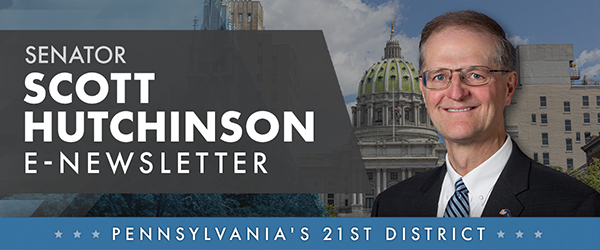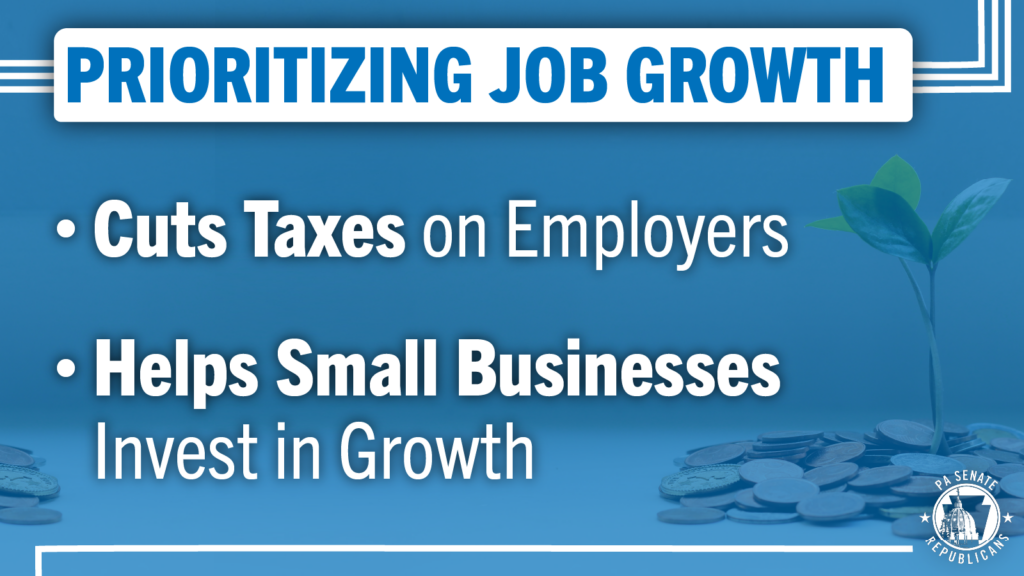
|
||||
|
In this Update:
New State Budget Enacted for 2022-23
The Senate approved a $45.2 billion General Fund Budget for Fiscal Year 2022-23. I am concerned these spending levels will be unsustainable in the future, especially when the one-time federal money dries up and if our economy goes into a recession. For this reason, I voted against the spending portion of the budget. However, as Senate Finance Committee Chairman, I was pleased to have played a major role in enacting some key pro-growth, pro-jobs tax policies as part of the budget process. We are making Pennsylvania much more competitive to attract and retain both small businesses and large businesses, goals I have pursued since my first election. The budget does not include any broad-based tax increases and actually cuts the Corporate Net Income tax rate, which is now the highest in the nation. The new budget cuts the rate from 9.99% to 8.99% and creates a phased reduction to 4.99%, or sixth lowest, by 2031. Not only will a lower rate attract new business, it also makes the state more attractive for businesses that already operate here and need to expand. Legislation I sponsored to help small businesses was part of the budget. It brings state tax law governing expense deductions in line with federal law, eliminating the unequal treatment of small businesses in Pennsylvania. The increase in limits makes it easier for employers to buy equipment and to invest, which promotes job growth. We also eliminated a disadvantage faced by Pennsylvania small businesses when competing with those in other states. Under federal tax law, a “like-kind” exchange under the Internal Revenue Code allows for tax deferral when property is exchanged for similar property. This long-standing federal provision allows employers to invest in the job-creating assets businesses need to remain competitive. Every state but Pennsylvania provides for a similar deferral on the state level. Overall, the budget spends too much and will make the next few years harder to navigate responsibly. On the upside, the changes outlined above will make Pennsylvania more competitive with surrounding states and send a strong message to employers that our Commonwealth is open for business. New Law Stops Wolf Plan to Toll Interstate Bridges, Requires Transparency
Legislation I co-sponsored to stop the Pennsylvania Department of Transportation (PennDOT) from imposing new tolls on existing bridges with a Public-Private Transportation Partnership (P3) has been signed into law. The Canoe Creek Bridges on Interstate 80 was among the spans targeted for tolling.
Gov. Tom Wolf, who had threatened to veto the bill, reached a compromise following the Commonwealth Court’s two rulings against PennDOT’s plan. This scheme was a new tax on motorists who already pay taxes for roads and bridges and on local communities facing new infrastructure costs caused by traffic diverted to their streets by drivers trying to avoid the new tolls. And it was done with virtually no public or legislative input. These reforms will ensure that the process is transparent, and motorists and legislators have a say in future P3 projects. Hutchinson Bill to Provide Safer Options for Heavy Hauling Permit Holders Becomes Law
Legislation I sponsored to provide safer options for heavy hauling permit holders has been signed into law. Currently, heavy hauling permits 50H and 50J needlessly restrict the number of axles that a tractor-trailer combination may use to haul 95,000 pounds. (5 axles) and 107,000 pounds. (6 axles), when hauling pulpwood or wood chips. As a member of the Hardwoods Development Council, I knew this law needed to be changed. Act 91 of 2022, which was enacted July 11 and takes effect in 60 days, will allow for permit holders to have the option to use equipment with additional axles if the load meets the weight criteria of the permit. This change will improve safety because additional axles provide more breaking power to enable the vehicle to stop more quickly. In addition, it will lead to less wear and tear on roads and bridges since increasing the number of wheels in contact with the road spreads the weight of the load over a wider surface area. Deana’s Law Increases Penalties for Repeat DUIs
The Senate recently passed legislation that is now law to increase penalties for multiple DUI offenders. Act 59 of 2022, Deana’s Law, would require consecutive sentencing, instead of concurrent, for fourth DUIs and above. It would also increase penalties for drivers with multiple DUI convictions involving high blood alcohol content levels. The law is named after Deana Eckman, 45, who was killed in a 2019 crash involving a six-time DUI offender. Funding Available for Projects that Promote PA Farm Products
Nonprofits can apply now for grants for projects that promote Pennsylvania farm products and grow export markets. The Pennsylvania Department of Agriculture will award up to $303,000 in matching funds to nonprofits to reimburse up to 50% of costs for promotional and educational projects intended to increase consumer awareness and sales. Eligible projects in 2022 can promote anything from wine to wool, hardwoods to honey, fruit, vegetables, herbs, meat, poultry or dairy — any agricultural product produced in PA. Complete guidelines for the Pennsylvania Agricultural Product Promotion, Education and Export Promotion Matching Grant Program are in the Pennsylvania Bulletin. Grant applications must be submitted online through the Department of Community and Economic Development Electronic Single Application. Applications are due by Aug. 5. Accessing Local and County Crime and Crash Data
When crimes and crashes are investigated by the Pennsylvania State Police, the statistical data is available online through the Community Access to Information Dashboard (CAID). CAID allows the public and the media to access and search data collected from traffic enforcement and crashes for both commercial and noncommercial vehicles, including Incident maps. There’s also data concerning various crimes, with mapping for counties and municipalities. The dashboard allows the user to choose what data is displayed. Searches can be refined with custom date ranges, locations and categories. Queries can be made in the dashboard with statistical information from as far back as 2019. The dashboard contains no information that could be used to identify the individuals involved. How to Conserve Energy and Manage Summer Power Bills
As hot weather settles in, the Public Utility Commission (PUC) offers tips on conserving energy and keeping summer power bills manageable.
You can find more tips here. For consumers struggling with paying utility bills, the PUC continues to encourage them to call their utilities to discuss the many different affordability options available. |
||||
|
||||



Want to change how you receive these emails? 2025 © Senate of Pennsylvania | https://www.senatorscotthutchinson.com | Privacy Policy |






